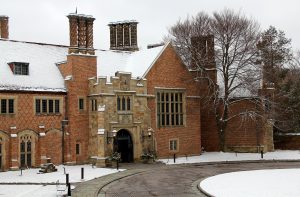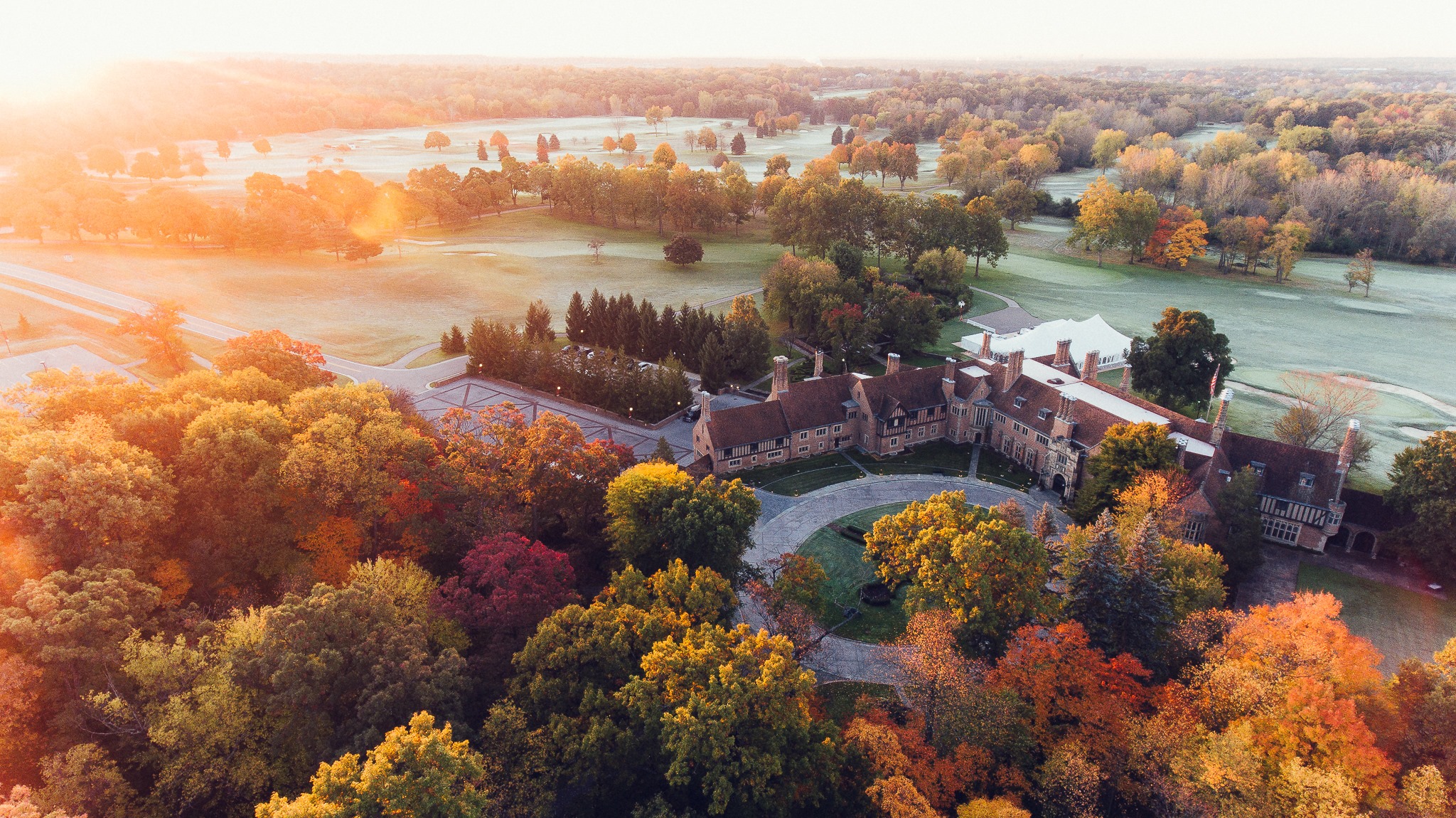Meadow Brook Hall is an iconic symbol of America’s automotive aristocracy, built due to the success of Matilda Dodge Wilson’s first husband John F. Dodge in the automotive industry. With its 110-room Tudor-revival mansion featuring exquisite craftsmanship and original family furnishings, hand-carved stonework, stained glass, carefully selected marble decorations, impressive gardens, and expansive estate grounds attracting numerous recreational activities, Meadow Brook Hall stands as a perfect representative of the golden era of American grandeur.
Meadow Brook Hall proudly stands as a National Historic Landmark, a breathtaking testament to the achievements and good fortune of Matilda Dodge Wilson and her first husband John F. Dodge – co-founder of the Dodge Brothers Motor Car Company. This incredible home is an indirect product of John F. Dodge’s success in the automotive industry, and his tragic death in 1920 left Matilda one of the world’s wealthiest women. Matilda’s fortune not only built Meadow Brook Hall – one of America’s finest residences and country estates – it also supported numerous Detroit charities and organizations, ultimately leading to the founding of Oakland University.
Built During the Country Place Era
Meadow Brook Hall was built during America’s “country place era” between the late 19th and early 20th centuries. This period was marked by a desire to escape from the hustle and bustle of the city, and instead embrace a rural lifestyle with country estates. The 110-room Tudor-revival mansion stands as an icon of America’s automotive aristocracy; it features exquisite craftsmanship, architectural detailing, and a grand scale of 88,000 square feet, inspired by the manor homes of England. Meticulously preserved with original family furnishings and art, Meadow Brook Hall boasts carved wood and stone, ornate plaster ceilings, Tiffany stained glass, custom-made hardware, and fine and decorative art. To keep up with modern life, the estate is equipped with modern amenities, making it suitable for the active lifestyle of the Wilson family. The expansive 1,500-acre estate also includes several residences and provides a splendid setting for recreational activities such as equestrian sports, motoring, and gardening.

Dedication to Detail
Matilda and Alfred set out to create a grand monument to the Dodge family fortune. With their sights set on a 110-room, 88,000-square-foot Tudor-revival style home, they commissioned the Detroit architectural firm of Smith, Hinchman & Grylls to design and build Meadow Brook Hall at Meadow Brook Farm, the family’s country retreat. On Matilda’s 43rd birthday, October 19th, 1926, groundbreaking ceremonies for the hall were held. Matilda was dedicated to every detail of the project, from switch plate covers to woods to fine and decorative arts and furnishings. Wallace Newton, her decorator, commented that she “preferred stout colors” and wanted only solid woods and marble for the project. It was clear that Matilda was the driving force behind the construction and decoration of Meadow Brook Hall, setting out to create a suitable monument for her children.
Exquisite Craftsmanship and Intricate Architectural Detailing
Meadow Brook Hall, completed in 1929 at a cost of nearly $4 million, is renowned for its exquisite craftsmanship, intricate architectural detailing, and grand scale. The exterior of the house features American materials such as brick, sandstone, wood timbers, and clay shingle tile, while the 39 unique brick chimneys give the picturesque roofline an impressive silhouette. Inside, the interiors are elaborate with carved wood and stone, handmade hardware and ceramic art tile, ornately molded and carved plaster ceilings, stained glass window insets, crystal and art glass lighting fixtures, and gold-plated bathroom fittings. Additionally, the house is equipped with every modern amenity available in the late 1920s, including full electricity, central heating, two elevators, three kitchens, and a home theatre. Despite being influenced by English manor houses of the 16th, 17th, and 18th centuries, Matilda Wilson was proud that the hall was mainly made of American materials and crafted by Americans – demonstrating their commitment to quality and dedication to excellence.
The dining room and Matilda’s study are 18th-century Neo-classical, Matilda’s room, and the French bedroom are 18th-century French Rococo, and Frances’ bedroom is American Colonial – reflecting the sophistication of the era.
Meadow Brook Hall Collection
Meadow Brook Hall Collection is an impressive collection of furniture, paintings, and decorative art from across several centuries and around the world, gathered by Matilda during her lifetime. A magnificent home, it proudly preserves the lavish lifestyles and era of the American industrialists of the early 20th century with its original furnishings and art. Possessing a wealth of original paintings, sculptures, prints and drawings, furniture, ceramics, carpets, glass, silver, costumes, and other textiles, as well as family archival materials, Meadow Brook Hall Collection stands out with its Tiffany art glass, costumes by Paul Poiret, Stickley furniture, paintings by Sir Joshua Reynolds, Sèvres and Meissen porcelain, and Rookwood pottery.
The Legacy of Meadow Brook Hall
The Dodge/Wilson family were immensely proud of their home, Meadow Brook Hall. Built-in 1929, Matilda lived there until she died in 1967, apart from a brief period during the Depression when she closed it partially for appearances and financially due to the difficulty of maintaining a house of that size. Despite this, the family still hosted many family and social gatherings over the 38 years they lived there, showing off its architecture, grounds, art, and furnishings with pride.
Notable events included Frances’ wedding in 1938, her 25th birthday party in 1939 featuring the Tommy Dorsey band and Frank Sinatra as entertainment, Barbara Wilson’s coming out party in 1950, and the largest gathering of Oakland University students, faculty, and alumni in 1963 for Matilda’s 80th birthday.
Matilda Wilson’s Legacy at Meadow Brook Hall
With a deep commitment to her heritage and the preservation of history, Matilda Wilson donated her residence, its collections, the estate’s 1,400 acres, and $2 million to found what would become Oakland University in 1957. Four years after her death, Meadow Brook Hall opened to the public in 1971, providing an opportunity for future generations to be inspired and educated by their history. Matilda’s vision of sharing knowledge of the past to help people face the challenges of the future was realized through the glorious architecture, beautiful fine and decorative art, and grandeur of Meadow Brook Hall.
Today, more than 70,000 people visit the Hall each year to enjoy tours, educational programs, and special events.
Meadow Brook Hall’s remarkable significance lies in its story of prosperity, tragedy, and dedicated stewardship. As the grand monument to Matilda Dodge Wilson and her first husband John F. Dodge, this incredible estate speaks to the rich history of America’s automotive aristocracy, their timeless architectural values, and the painstaking preservation efforts that have kept it alive for all these years. Even though much has changed since the construction of Meadow Brook Hall a century ago, it stands as a stark reminder of the Dodges’ achievement and influence on both Detroit and society in general.





